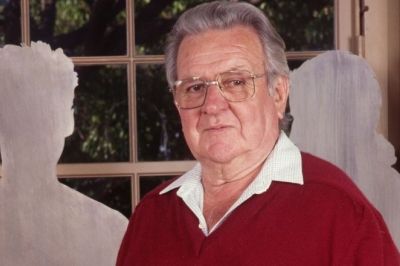State Memorial for Jack Mundey AO
A State Memorial Service for Mr Jack Mundey AO took place on Wednesday 10 March 2021 in Sydney.
The State Memorial took place at Sydney Town Hall on Wednesday 10 March 2021.
The State Memorial was an important opportunity to honour the former trade union leader and conservationist who led Sydney’s Green Bans movement during the 1970s.
Mr Mundey rose to prominence when he became the leader of the NSW Builders Labourers Federation (BLF) in 1968, as Sydney was entering its construction boom.
During the 1970s, as leader of the BLF, Mr Mundey instituted 40 Green Bans — a type of strike where union members refused to work on projects — saving much of Sydney’s heritage and environment spaces.
Not only was Mr Mundey a crusading unionist, but he was a strong advocate on issues from safety reforms on building sites to wider issues such as feminism, gay rights and international politics.
Described as ‘a visionary’, Mr Mundey is credited with helping save many historic Sydney sites including The Rocks, Centennial Parklands, Pitt Street Congregational Church and Kelly’s Bush. He also stopped high-rise office blocks and hotels being built at Woolloomooloo, with most of the area instead retained for social housing at the time.
From 1984 to 1987, Mr Mundey served as a councillor on the City of Sydney, representing The Rocks. He was appointed as a councillor on the Australian Conservation Foundation from 1973 and in 1995 he was appointed chair of the NSW Historic Houses Trust. He was also a life member of the National Trust.
Watch the memorial
Watch the State Memorial for Jack Mundey AO, which was held on Wednesday 10 March 2021.

A State Memorial Service for Mr Jack Mundey AO
Biography
Jack Mundey AO
(17 October 1929 to 10 May 2020)
Mr John Bernard Mundey AO was born 17 October 1929 in Northern Queensland, where his love of nature and the environment started. He was one of five children and grew up on a share farm on the lush Atherton Tableland, raised by his father and older siblings after his mother died when he was six years old.
With a natural talent for sport, Mr Mundey moved to Sydney in 1951 as a professional footballer and played rugby league for the Parramatta Eels for three years, while also working as a labourer.
At the same time, with his keen sense of injustice like many others of his generation, he joined the Communist Party of Australia.
In 1965, during the anti-Vietnam war movement against conscription, Mr Mundey and two other activists, held one of Australia’s first sit-ins and were arrested. Throughout his life, Mr Mundey would put himself on the line for many causes.
During the 1960s, Mr Mundey was an outspoken and active leader of the Builders’ Labourers Federation (BLF), campaigning for better work conditions.
He married his first wife Stephanie (nee Lennon) and their son Michael was born in 1960. Sadly, in 1961 Stephanie died from a cerebral tumour, aged 22. Michael died in car accident, also at the age of 22, in 1982.
Mr Mundey married lawyer and feminist Judith Willcocks in 1965, who remained his comrade and partner until his death at the age of 90 in Sydney on 10 May 2020.
By 1968, Mr Mundey had been elected secretary of the NSW Builders Labourers Federation, as Sydney was entering its construction boom.
During the 1970s, as leader of the BLF, Mr Mundey instituted 40 green bans – a type of strike in which union members refused to work on projects – saving much of Sydney’s heritage and environment spaces.
The Green Ban movement is credited with saving many of Sydney’s inner heritage suburbs including The Rocks, Woolloomooloo, Darlinghurst and Glebe – as well as scores of heritage buildings in Sydney’s CBD, Kelly’s Bush in Hunters Hill, parts of Centennial Park and the Botanical Gardens, housing for the Aboriginal community of Redfern and heritage areas in the regional city of Newcastle and elsewhere.
Described as ‘a visionary’, Mr Mundey is credited with helping save many historic Sydney sites from being bulldozed for high-rise office blocks and hotels and instead being retained for social housing at the time
From 1984 to 1987, he served as a councillor on the City of Sydney, representing The Rocks. He was appointed chair of the NSW Historic Houses Trust in 1995.
Mr Mundey lectured extensively and published prolifically on urban conservation. While Mr Mundey had no formal tertiary education, in 1998 he was awarded an honorary Doctorate of Letters from the University of Western Sydney for his role in the conservation movement and an honorary Doctorate of Science from the University of NSW. In 2001 he was awarded a Master of the Environment degree by Sydney University.
Mr Mundey was a committed environmentalist and was a national councillor with the Australian Conservation Foundation for 20 years and was awarded life membership when he stepped down.
In 1998, he was elected as one of the National Trust of Australia's 100 Living National Treasures and in 1999 was awarded Life Membership of the National Trust of NSW. He was also awarded life membership of the CFMEU, Unions NSW and the Local Government Association of NSW.
In 2000 he was made an Officer in the Order of Australia.
Not only was Mr Mundey a crusading unionist, he was a strong advocate on issues from safety reforms on building sites to wider issues such as feminism, gay rights and international politics.
Mr Mundey continued to be involved in environment and urban issues and opposed threats to historic Sydney sites.
By the early 2000s, Mr Mundey had joined the Greens and remained a member until his death.
